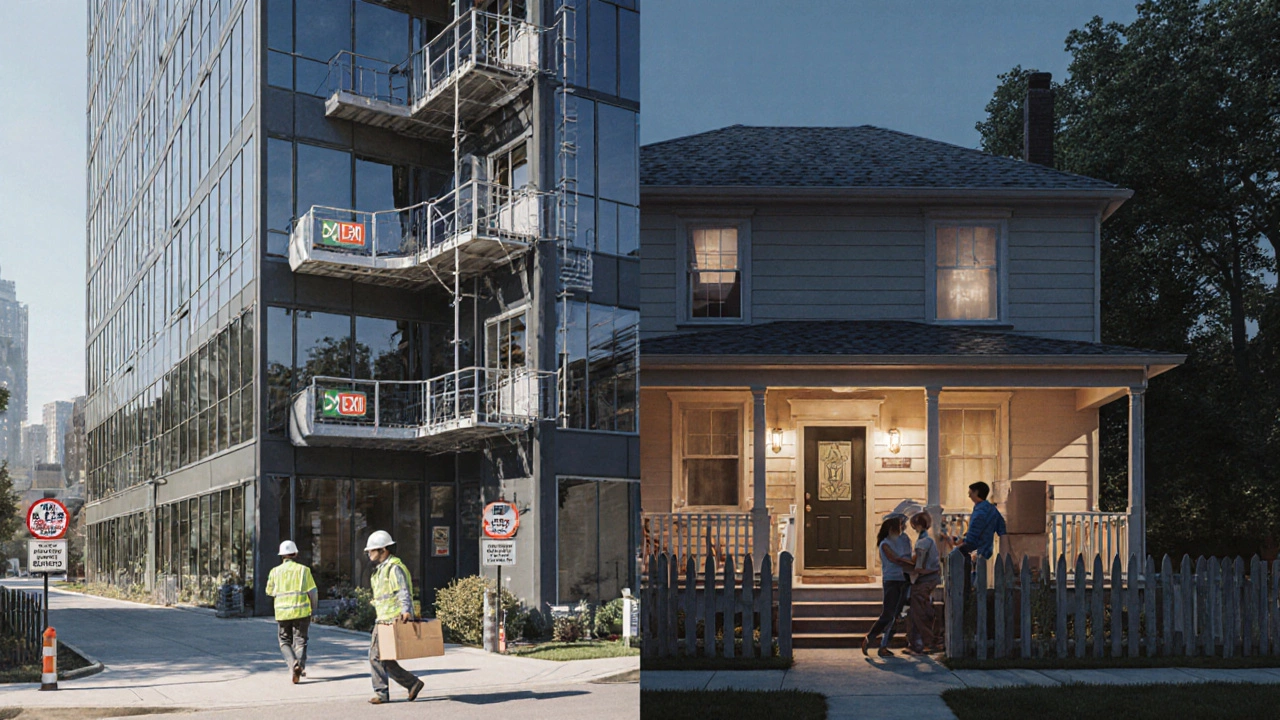Commercial Construction: Practical Tips, Rules, and Flooring Ideas
If you’re planning a new office, shop, or warehouse, the first thing you’ll hear is "commercial construction". It sounds big, but breaking it down into bite‑size steps makes it doable. Below you’ll find the most useful info to keep your project on track, from choosing the right building type to sorting out permits and picking the perfect floor.
Pick the Right Construction Type for Your Business
Commercial buildings aren’t all the same. A steel‑frame office tower, a wood‑framed retail shop, and a concrete warehouse each have their own strengths. Think about what matters most for your use:
- Load‑bearing needs: Heavy equipment or lots of foot traffic call for stronger columns and floors.
- Fire safety: Some codes demand fire‑resistant walls or sprinkler systems, especially for public spaces.
- Future changes: If you might expand later, a modular design can save time and money.
When you match the construction type to your business goals, you avoid costly redesigns down the line.
Navigate Permits, Zoning, and Regulations
In the UK, every commercial project must meet local planning rules. First, check the zoning map for your site – it tells you whether an office, shop, or mixed‑use building is allowed. Next, apply for a Building Regulations approval; this covers fire safety, structural stability, and accessibility.
A quick tip: talk to the council early. A short meeting can reveal hidden restrictions like height limits or required parking spaces, saving you weeks of back‑and‑forth.
Don’t forget insurance. Commercial construction insurance typically covers site damage, public liability, and contract works. Knowing what’s covered helps you budget for unexpected events.
Now that the legal side is clear, let’s talk about the heart of any commercial space – the flooring.
Choosing Flooring That Works for Commercial Spaces
Flooring isn’t just about looks; it affects durability, safety, and even employee comfort. Here are three solid options:
- Commercial‑grade carpet tiles: Ideal for offices where noise reduction matters. They’re easy to replace if a single tile gets stained.
- Vinyl composition tiles (VCT): Perfect for high‑traffic areas like retail aisles. They resist scratches and are simple to clean.
- Polished concrete: Great for warehouses or modern showrooms. It’s tough, low‑maintenance, and can be stained for a pop of colour.
Ask your flooring supplier about slip‑resistance ratings – they’re required by health and safety law for many commercial settings.
Finally, keep an eye on the project timeline. Commercial builds often run on tight schedules, so choose a flooring system that can be installed quickly without sacrificing quality.
By understanding the construction type, handling permits early, and picking the right floor, you set your commercial project up for success. Need more help? Our team at First Choice Flooring can guide you through every step, from design to installation, ensuring your space looks great and meets every rule.
What Does 'Commercial Project' Mean in Construction?
- Gavin Whitaker
- |
- |
- 0
A commercial project refers to any construction built for business use-offices, retail, hotels, warehouses. Unlike homes, these buildings prioritize durability, compliance, and income generation. Learn what sets them apart and why they shape city landscapes.
View moreWhat Defines Being Commercial in Construction?
- Gavin Whitaker
- |
- |
- 0
Commercial construction is defined by its purpose: generating income through business use. It follows stricter codes, higher operational demands, and different financing rules than residential buildings. Size doesn't matter-intent does.
View moreCan You Have Two Construction Types in One Building?
- Gavin Whitaker
- |
- |
- 0
Yes, you can have two construction types in one building-like steel and wood-but only with proper fire walls and code-compliant separation. Learn how mixed construction works in commercial projects and what can go wrong.
View moreWhat Is the Difference Between Civil and Commercial Construction?
- Gavin Whitaker
- |
- |
- 0
Civil construction builds infrastructure like roads and bridges, while commercial construction creates buildings for business use like offices and stores. Learn how their goals, regulations, timelines, and teams differ.
View moreWhat Does Civil Construction Include? A Clear Breakdown of Key Components
- Gavin Whitaker
- |
- |
- 0
Civil construction includes roads, bridges, water systems, sewage networks, and public transit - the essential infrastructure that keeps cities running. Learn what’s included and how it differs from commercial building projects.
View moreWhat Makes a Building Commercial? Key Features That Define Commercial Properties
- Gavin Whitaker
- |
- |
- 0
A building becomes commercial not by how it looks, but by how it's used - for profit-driven activities like retail, offices, or hospitality. Zoning, building codes, and insurance all change when a space crosses from residential to commercial use.
View moreWhat Does Civil Construction Include? A Clear Breakdown of Key Components
- Gavin Whitaker
- |
- |
- 0
Civil construction includes roads, bridges, water systems, stormwater control, and public utilities. It's the infrastructure that keeps communities running, built by public funds and designed for long-term safety and function.
View moreCommercial vs Residential Construction: Which Is Better for Your Project?
- Gavin Whitaker
- |
- |
- 0
Commercial and residential construction serve very different purposes. Learn the key differences in cost, timeline, financing, and risk to decide which type of building is better for your goals.
View moreWhat Is Type 5 Building Construction? Understanding Wood-Framed Structures in Commercial Use
- Gavin Whitaker
- |
- |
- 0
Type 5 building construction uses wood framing for small commercial buildings like retail stores and clinics. Learn how it works, where it's allowed, fire safety rules, and what to check before leasing or buying.
View moreCommercial vs Non-Commercial: Clear Definitions, Practical Examples & Key Differences
- Gavin Whitaker
- |
- |
- 0
What separates commercial from non-commercial in construction, business, and daily life? Understand the differences, see how these categories impact rules, money, and your own projects.
View moreIndustrial and Commercial Construction: Are They Really the Same?
- Gavin Whitaker
- |
- |
- 0
Ever wondered if industrial and commercial construction are just two names for the same thing? This article digs into what actually separates these two huge pieces of the construction world. You'll find out how their projects, needs, and even teams can be very different. Plus, there are helpful tips for anyone thinking about a new building or trying to pick the right contractor. Get ready for some real talk that clears up the confusion.
View moreCommercial vs Non-Commercial: What Sets Them Apart in Construction?
- Gavin Whitaker
- |
- |
- 0
This article breaks down the real differences between commercial and non-commercial buildings in the world of construction. You'll find out what makes a project count as commercial, how regulations and codes change based on the type, and why these differences matter for contractors and owners. We've included facts about zoning, permits, and costs, along with tips for handling the main challenges on each side. Let’s clear up the gray areas and make sense of where your project lands.
View more










